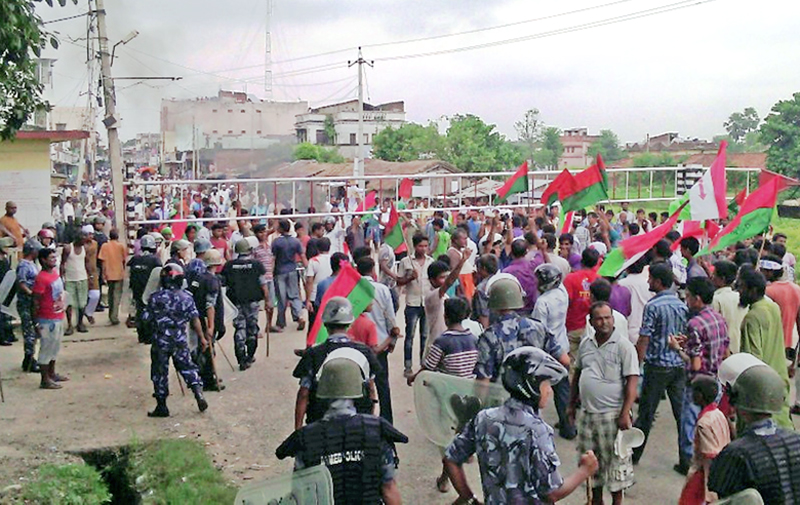Indefinite general strike disrupts life in Tarai
Nepalgunj/Rautahat, August 22
Originally from Manau of Bardiya, Dinesh Tharu has a hard time managing two meals a day in Nepalgunj. “I have run out of cash, but I cannot go anywhere for work due to the bandh,” he bemoaned.
Dinesh has two children and wife, but he had to take loan from his boss to feed the family of four. “It is uncertain when the bandh will be lifted, but the increasing loans have burdened me. I wish they lift the strike at the earliest,” he pleaded.
Dinesh represents many others facing similar ordeal brought about by the indefinite general strike in Tarai. Daily wage earners have also been at the receiving end.
READ ALSO: Let us study, say students
Nepalgunj has been closed for the past 11 days. The continued bandh called by United Democratic Madhesi Front and Tharuhat Joint Struggle Committee has dealt a hard blow on daily wage earners.
Rickshaw puller Shankar Berma said he was having a tough time managing two meals a day. “Bandh enforcers do not allow us to pull the rickshaw. How am I supposed to arrange money for food?” Berma lamented.
The strike has deprived students of education while businesses and market places have pulled down their shutters.
Balram Bohara from Nepalgunj Karkando said he was worried as he could not pay his bank installment. He has been running New Sworgadwari Hardware Shop with bank loan in Nepalgunj.
Regional Chief Krishna Bhandari of Siddhartha Business Group and Hospitality Private Limited said their business had been incurring hefty loss due to the strike. The group has three star hotels in Nepalgunj and Surkhet. Bhandari said they were having a hard time paying the salary of hundreds of staffers.
Nepalgunj Chapter of Federation of Nepalese Chamber of Commerce and Industry Chairman Krishna Prasad Shrestha said the continued bandh had left business in tatters. “Banke district incurs a loss of Rs 50 million a day due to the bandh,” he said. He asked the stakeholders to seek an alternative to the strike.
Chairman Shrestha warned of retaliation if the bandh was not called off soon. Scores of heavy trucks have been stranded at India’s Rupaidiha due to the bandh.
Locals have been facing shortage of LPG gas cylinders due to obstruction of gas import.
Meanwhile, in Rautahat, daily-wage labourers working in hotels, transportation sector, and elsewhere have been directly affected by the strike while for others, shortage of basic commodities has made life worse.
Vehicular movement has been disrupted and this has resulted in the closure of dozens of fuel stations across Rautahat. “The strike has mostly affected daily wage earners,” said transportation worker Shyam Tiwari. Shutdown of fuel stations has also hit the farmers.
“The rainfall isn’t adequate and diesel is in shortage so we can’t irrigate our fields through boring well,” lamented Bhushan Singh, a farmer of Saruatha, expressing his concerns about the ongoing black marketing. Traders and businessmen also bemoaned the loss they have been bearing due to the strike. “Whatever the objectives or goals, the strike is affecting the life of common people. So, the state should pay heed and do the needful to end this situation,” said Ram Prabesh Sah, a small-time trader of Matsari.






